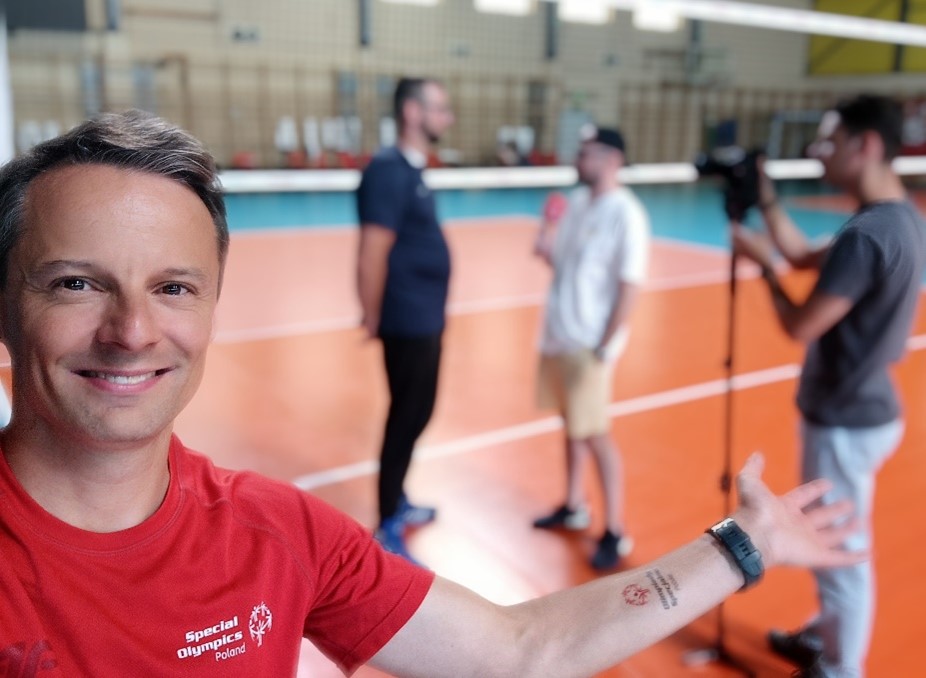Special Olympics Poland’s Men/Mixed Volleyball Head Coach, Radek Łypczak, shared his background with volleyball and his coaching philosophy as he gears up to head to Katowice with his team next week for the Special Olympics Unified Volleyball World Cup.
1. What is your background with Volleyball?
I have loved volleyball since childhood. When I was 9 years old, I was accepted into a sports class with a focus on volleyball so the second part of elementary school was filled with volleyball practices, camps, and competitions.
Later, I betrayed volleyball for a while in favor of football (laughs). Fortunately, I came to my senses in time and returned to my beloved sport. For the past 10 years, I have been coaching a Unified volleyball team within Special Olympics Poland. The World Cup in Katowice will be my fifth international volleyball event and my second at the world level.
2. What level of coach training have you received?
I completed Sports Instructor training organized by the Regional Association of Coaches and Sports Instructors in Łódź, Poland. I have attended many coaching courses and conferences in various sports disciplines.
I also hold a UEFA C football coaching license issued by the Polish Football Association.
3. How do you continue to improve your coaching ability?
There are many ways to keep learning: training courses, the internet, and exchanging knowledge with fellow coaches. But the best way is to watch the best. Demonstration practices by different teams are a great source of knowledge. I remember one in particular from 2018, when we were at the annual Special Olympics sports camp in Zakopane. The Polish National Volleyball Team was there as well and its head coach, Vital Heynen, decided to open the final practice before the World Championship to the public. We went with our whole camp, about 40 people. The training lasted well over two hours. We sat there and studied Michał Kubiak, Bartosz Kurek, and the rest of the team up close. Right after that last training in Poland, the team went on to defend their World Championship title in Italy. The atmosphere was extraordinary, and the drills were out of this world. It was an inspiring experience.

Photo by (c) Adam Nurkiewicz/(c) Adam Nurkiewicz Adam Nurkiewicz
4. How important is it for you to continue to learn as a coach?
As a coach, if you don’t keep learning and developing, you fall behind. In each training cycle, I try to pick one element of the game or practice to focus on more intensely. I search for or create new drills. This way, every area of my coaching craft is constantly developing.
5. Why did you decide you wanted to be a coach?
Since childhood, I have wanted my life to be connected with sports partly because I love being active and spending time with people working toward a common goal. When I was young, I observed the coaches I met along the way. They always seemed like really great people and I wanted to be like them.
6. What have you learned about yourself as a coach working with Special Olympics?
Humility, passion, and satisfaction. I think it would be hard to work as a Special Olympics coach without passion. You have to feel a certain kind of connection with people with intellectual disabilities. For over 20 years, I have worked as a therapist with such individuals, but sport gives me the most satisfaction. The other side of the coin is humility, which I try to bring to every challenge.
7. Can you give an example of how you were able to help an athlete improve their performance beyond any medals they may have won in Special Olympics?
Yes! There is a young man on our team—Krystian Fafara. He is now 22 years old and a starting player. We’ve known each other for over five years, and I remember when he first came to practice. He was a young kid who really wanted to play but didn’t fully understand what was happening around him. Regular participation and his eagerness to learn made him, after a few years, a stable player with solid abilities. Hopefully, Krystian will “shine” at the World Cup in Katowice because we will need him a lot, especially in attack and blocking.
